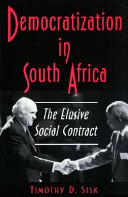
Democratization in South Africa: the elusive social contract
By - Sisk, Timothy D.
Floor
-
Floor 1
ISBN 10 - 0691036225
ISBN 13 - 9780691036229
Book Status
-
1 Qnty Available with us.
Subject
-
Democracy South Africa
, Social contract
Shelf No
-
15
common.call_no
-
321.8096 SIS
common.physical_description
-
xiii, 342 pages: illustrations, map; 25 cm.
Notes
-
Includes Bibliographical References and Index.